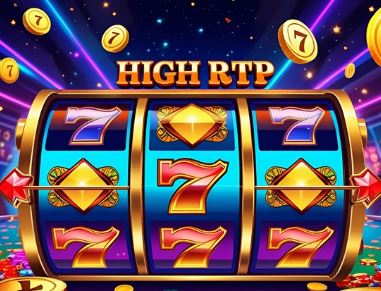Online Slots RTP: How To Find It & What Is a Good RTP?
RTP is a term you’ll often see when reading about online slot games, but it’s not always explained clearly.
This guide breaks it down in plain English, so you can better understand what it means, why it might influence your choice of game, and how to find it for the slots you’re interested in.
You’ll also see how RTP values can vary from one slot to another, what the figures represent in practical terms, and why it’s important to remember that they are not predictions of what will happen in your own play. Think of it as a starting point for making informed choices.
What Is RTP In Online Slots?
RTP, or “Return to Player,” is a theoretical figure that shows the percentage of total stakes that a slot game is designed to pay back to players over a very large number of spins.
For example, a slot with a 96% RTP may return £96 for every £100 wagered, but this figure is calculated from millions of simulated spins, not from just a handful. The key word here is “theoretical.”
Every spin is completely independent and determined by a Random Number Generator (RNG). This technology ensures that the result of one spin has no impact on the next. As a player, you could walk away with more than the average suggests, much less, or no win at all. The RTP simply provides a long-term average for the game as a whole, not a forecast for you personally.
Does RTP Matter & Is Higher RTP Better?

For some players, the RTP is an important factor when deciding which slot to play. In theory, a game with a higher RTP means that more of the total money staked may be returned to players over time. However, this doesn’t automatically mean you might win more during your own play. Results are unpredictable, thanks to the RNG.
Some people may be drawn to high-RTP slots in the 95–97% range because they may offer steadier potential returns across many spins.
Others might prefer jackpot slots, which often have RTPs closer to 85–90%, because they include the possibility—however small—of winning a much larger prize. In these games, a portion of every bet contributes to the potential jackpot, which is why the displayed RTP can be lower.
What’s “better” depends entirely on what you are looking for from a game: a steadier pace with the possibility of smaller wins, or the chance at something bigger, but less frequent.
If you want to check out some high RTP slots here at Red Casino, why not play Big Bass Splash, the King Kong Cash slot or the Eye of Horus slot, which are all popular options at our online casino.
What Is a Good RTP For Online Slots?
In the UK market, most online slots have an RTP in the 94–96% range. Many players treat anything above 96% as relatively high, while games that dip below 93% can be seen as potentially less favourable in the long run. But that doesn’t make them unplayable—your experience will still come down to personal preference.
A “good” RTP is a matter of personal interpretation. Some people may choose games offering a higher long-term return percentage, while others may select lower-RTP titles because they prefer the theme, game design, or features.
Understanding what the RTP represents can help you compare it with other aspects of a slot, such as volatility (how frequently and how much it may pay out over time) and the way prizes are structured.
Play Slots & Online Casino Games
How Do I Find RTP On Online Slot Machines?
If you want to check the RTP of a particular slot, start by opening the game and looking for an “Info,” “Help,” or “Paytable” button. This section usually contains the RTP percentage along with details about paylines, symbol values, and any bonus features.
If it’s not listed there, you can often find it on the developer’s website. Many game providers publish detailed specifications for each of their slot titles.
Some online casinos may also highlight RTP figures on their game library pages, or even have a category dedicated to higher-RTP games. While these features can help make comparison easier, it may be a good idea to confirm the number directly from the game, so you know it’s up to date.
RTP Slots Database: Does One Exist?
There’s no official UK-wide database that lists every slot and its RTP. However, there may be independent websites that publish their own collections of games and their theoretical returns. These can be useful for browsing or comparing multiple titles quickly, but they may not always be current.
A more reliable approach is to combine these resources with the information you find in the game itself. If you’re exploring a new casino, you might also notice that some have a “High RTP” section, or filtering tools so you can sort games by their stated percentage. This can be a convenient way to identify games that fit your preferences before you play.
Can Casinos Change The RTP of Slot Machines?
Casinos in the UK do not directly set or change the RTP of slot games. The percentage is programmed by the game developer. In some cases, a developer may create multiple versions of the same slot with different RTPs—for example, 95%, 96%, or 97%. The casino then chooses which version to offer in its library when the game is added.
Once the casino has chosen a particular version, they cannot adjust the RTP themselves. This system is designed to maintain fairness and ensure that the figure displayed to you matches the one programmed by the developer.
The UK Gambling Commission (UKGC) requires that RTP information is accurate and not misleading, so the number you see in the game should reflect the actual version being offered.
Conclusion
It’s important to remember that the RTP is not a promise of what will happen during your play. It’s based on simulations of millions of spins and represents a game’s long-term behaviour across all players combined. Your individual outcome may be far above or below that average.
Each spin is independent. There’s no pattern to follow, no “due” wins, and no strategy that ensures success. Gambling on slots is entirely a game of chance, and results can be unpredictable.
If you decide to play, set a budget that you’re comfortable with, take breaks, and stop if it stops being enjoyable. Responsible play helps keep the experience manageable and within your own limits.
*All values (Bet Levels, Maximum Wins etc.) mentioned in relation to these slot games are subject to change at any time. Game features mentioned may not be available in some jurisdictions.
**The information provided in this blog is intended for educational purposes and should not be construed as betting advice or a guarantee of success. Always gamble responsibly.
































































